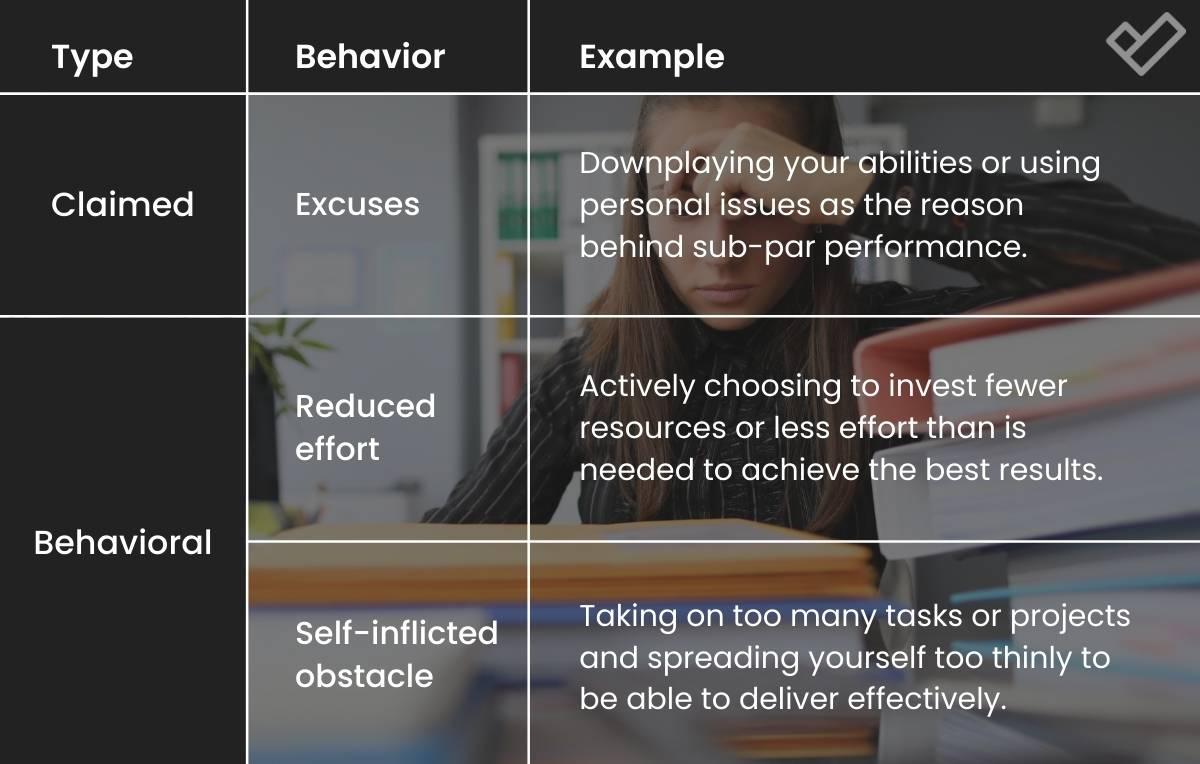Have you ever found yourself setting up excuses before a big pitch or delaying the launch of a product just because it wasn't "perfect"? You might be falling into the trap of self-handicapping without even realizing it. This clever, albeit destructive, tactic involves creating hindrances that make success harder to achieve—essentially setting yourself up to fail before you even begin.
It's a defense mechanism that helps make sure you have a handy excuse if things don't pan out, but at what cost?
It's time to take a closer look at how these patterns can stifle your growth.
Read on to discover how self-handicapping could be quietly eating away at your entrepreneurial success and what you can do to overcome it.
What is self-handicapping?
Self-handicapping is a fascinating psychological mechanism where you, perhaps without even realizing it, set up barriers or excuses that you can later blame if things don’t go your way. Think of it as pre-installing a safety net to catch your self-esteem if it takes a hit, so you can say, "It wasn’t really my fault."
There are two main types of self-handicapping. One is behavioral self-handicapping, which involves actively doing something (or not doing something) that can impair your performance.
For instance, you might procrastinate on preparing for an important presentation or deliberately set goals that are too lofty to realistically achieve. This way, if you fail, you can point to these self-imposed barriers rather than question your competence.
On the other hand, claimed self-handicapping involves making excuses in advance. It doesn’t necessarily involve any real action but centers around verbal or mental claims you make to cushion a potential blow to your self-esteem.
An example of this would be telling your team that you didn’t have enough time to fully prepare for a project. Here, you’re setting up an excuse for a potentially poor performance, even though you haven’t done anything concrete to sabotage it.

What are the root causes?
Let’s explore some of the main psychological drivers behind self-handicapping in entrepreneurship:
Fear of failure
If you've ever felt that failing would confirm your worst fears about yourself, this can lead to self-handicapping. This way, if you fail, you can blame the obstacles you placed in your own way rather than your abilities. It’s a protective buffer against the raw sting of failure, keeping your self-esteem intact by externalizing the reasons for not succeeding.
Fear of success
Contrary to what many would assume, success is not always eagerly anticipated. For some, the prospect of success brings about anxiety regarding the changes and new expectations that might come with it.
If this resonates with you, you might be tempted to hold yourself back to keep things the way they are. It helps you stay in your comfort zone where you feel more secure, even if it means sabotaging your progress.
Imposter syndrome
Feeling like a fraud who could be exposed at any moment is a common manifestation of imposter syndrome. This can lead you to self-handicap, providing a ready-made excuse in case you're "found out." It’s a way to shield yourself from the supposed shame of being unmasked as less capable than others perceive you to be.
Perfectionism
It's no surprise that perfectionism runs rife in the world of business ownership. With so much on the line and competition at an all-time high, it's easy to feel that there’s no option but to get everything just right.
But, paradoxically, the fear of not meeting your own high standards can often lead to procrastinating or avoiding certain tasks. It’s a complex defense mechanism that serves as a preemptive excuse for potential failure, protecting your self-esteem by attributing poor performance to a lack of effort rather than a lack of ability.
Impression management
Beyond these internal struggles, self-handicapping also serves as a form of impression management in the workplace. It's a strategy used to shape how others perceive you.
By lowering expectations through self-handicapping, you're essentially controlling the narrative about your performance. If you succeed, you look even more capable for overcoming the odds. If you fail, the pre-set excuses help maintain your reputation.

The high costs of self-handicapping
Self-handicapping might seem like a harmless way to protect your ego from failure, but the real cost is much higher, especially if you're in a leadership role or running a business. Let’s explore how this behavior can cost you more than you might realize:
Undermining leadership and decision-making
As a leader, your ability to make clear, confident decisions is crucial, as your team looks to you for direction and inspiration. Self-handicapping can throw a wrench in this process. If you're constantly setting up barriers for yourself, you're not just avoiding personal failure; you're also compromising your ability to lead effectively.
This might manifest as hesitancy in decision-making or a tendency to make safer, less innovative choices. In the long run, this can erode your team's trust in your leadership, as they might perceive you as indecisive or not fully committed to the company's vision.
Damaging self-esteem and self-efficacy
Self-handicapping can create a damaging vicious cycle when it comes to your self-esteem and self-efficacy—the latter being a crucial factor in entrepreneurial success, according to experts.
Self-efficacy, or the belief in your ability to accomplish tasks and achieve goals, plays a huge role in helping you stay motivated, bounce back from tough times, and take action when needed. People with strong self-efficacy are more likely to keep going when things get tough, aim high, and handle setbacks well. These qualities are key for tackling the ups and downs of business and achieving long-term success.
So, each time you attribute a failure to an external handicap you've created, you might feel a temporary relief from guilt or shame. However, if you're constantly avoiding responsibility, you miss out on valuable opportunities to learn from your mistakes and improve. Over time, this can erode your belief in your own abilities, making you less likely to aim high or take on challenging tasks in the future and reinforcing the cycle of doubt and underachievement.
Impact on business success
The costs of self-handicapping extend beyond personal repercussions; they can have a tangible impact on your business’s bottom line. Here’s how:
- Reduced motivation and lower quality of work: Research shows that self-handicapping has negative impacts on motivation and performance. If you’re not fully committed to your goals because you’re protecting yourself from potential failure, your motivation and the quality of your work can suffer. And if this trickles down to your products or services, your customer satisfaction and competitive edge can take a serious hit.
- Risk aversion: Innovation often requires a degree of risk-taking that self-handicapping shies away from. The fear of failure overwhelms the potential benefits of taking bold steps forward. This aversion can cause you to miss out on critical opportunities for growth, such as entering new markets, investing in new technologies, or implementing innovative business strategies.
- Reduced productivity: Self-handicapping means spending too much time creating excuses or barriers rather than focusing on productive activities. For instance, if you spend hours worrying about the potential reasons you might fail, you could be using that time to make sure you succeed. This delays individual projects and leads to bottlenecks that affect your entire operation, ultimately impacting your bottom line.
- Missed opportunities: Hesitation or avoidance, typical of self-handicapping, means watching potential game-changing opportunities pass by. Whether it's a chance to pitch to a significant client, the decision to expand product lines, or the opportunity to form strategic partnerships, not stepping up can mean staying behind.
- Damaged reputation: Consistently underperforming or showing a lack of initiative can tarnish your reputation among peers, clients, or potential investors. They might see you as unreliable or incapable of meeting challenges, which can be a big problem in industries where credibility is crucial. Rebuilding a damaged reputation takes time and effort, which could instead have been directed towards pushing your business forward.

How to spot signs of self-handicapping
Recognizing self-handicapping is a vital first step if you’re aiming to overcome it and drive your business toward success. It all starts with self-awareness—understanding your behaviors and the motives behind them. Self-awareness means taking a hard, honest look at your own patterns and responses.
Are you setting up roadblocks that don’t really need to be there? Are you making excuses that prevent you from reaching your full potential? Acknowledging these tendencies is key.
It might feel uncomfortable at first, especially since self-handicapping often masquerades as just being realistic or preparing for the worst-case scenario. However, this awareness is what will empower you to change these patterns. Here’s how you can peel back the layers and see if self-sabotage is at play in your actions or those of your team:
Self-assessment questions
Start with some introspection. Asking yourself the right questions can shed light on whether you're getting in your own way. Consider the following:
- Before a big project or decision, do you find yourself imagining all the ways it could go wrong?
- Do you often attribute failures to things outside your control rather than looking at your own role in the outcome?
- Can you recall instances where you’ve avoided taking on tasks unless success is guaranteed?
Recognizing patterns in behavior
Observing your behavior and reactions in certain situations can provide insights into whether you're self-handicapping. Look for patterns such as:
- Procrastination: Are there tasks you consistently push off until the last minute?
- Excuse-making: Do you often have a ready set of excuses for why things might not go perfectly?
- Setting unrealistic goals: Do you set goals so high that they’re almost unachievable, possibly to excuse poor results later?
Identifying triggers
What situations trigger self-handicapping behavior? It could be upcoming appraisals, presentations, or any high-stake scenarios.
Pinpointing these triggers can help you prepare and respond more constructively. For instance, if you know that public speaking tends to make you self-handicap, you could take steps to improve your skills and confidence in this area.
Observing team dynamics
If you’re a team leader, watch for signs of self-handicapping in your team members as well. This could be:
- Lack of initiative: Are team members hesitant to volunteer for new projects?
- Frequent complaints about resources: Do they often complain about not having what they need to succeed?
Creating an environment where feedback is regularly exchanged can help identify self-handicapping. Open discussions also foster a supportive atmosphere that can mitigate the need for such defenses.

How to escape the self-handicap trap
The following strategies can help you break free from the self-handicap trap:
Start small to build consistency
When you're used to setting up barriers for yourself, tackling big goals can feel overwhelming. Begin with small, manageable tasks that you can consistently complete successfully. This builds a pattern of achievements and boosts your confidence, gradually diluting the habit of self-handicapping.
Set realistic goals
While it’s great to aim high, setting goals that are too ambitious can fuel self-handicapping behaviors, as the fear of not reaching them can be paralyzing. Break your main goals into smaller, achievable steps. This approach makes the process less daunting and helps maintain your motivation without feeling the need to create excuses.
Recognize irrational thoughts
Recognize when you’re rationalizing poor performance or setting yourself up for failure. Catching these thoughts as they occur allows you to challenge and change them. It's about asking yourself, "Is this thought helpful, or is it an old pattern of self-handicap creeping in?"
Learn from setbacks
In the wise words of Microsoft co-founder Bill Gates, “It’s fine to celebrate success, but it is more important to heed the lessons of failure.” Every challenge you face is a chance to learn something new about yourself and improve your strategies. Adopting this mindset transforms the way you view obstacles, making it less likely for you to resort to self-handicapping as a defense mechanism.
Reframe negative self-talk
Negative self-talk can reinforce self-handicapping tendencies, so it's important to pay attention to how you speak to, and about, yourself. Simply switching from negative self-talk to more positive and encouraging thoughts can go a long way in restoring faith in your abilities and developing a more optimistic outlook that inspires you to do what's needed.
For example, instead of saying, "I’m no good at this, so I know," try reframing it to, "I have faced challenges before and learned from them, so I can handle this situation too."
Keep your goals in sight
Regularly remind yourself of the bigger picture and the end result you're working towards. When you keep your goals in mind—whether they're for work, personal growth, or anything else—it reminds you why you started and encourages you to keep moving forward. It gives you a clear purpose and helps you push through tough times when you might be tempted to hold yourself back.
What’s the bottom line?
Running your own business isn't for the faint-hearted. You need to be resilient, adaptable, and proactive if you want to navigate the unpredictable challenges and seize opportunities that come your way. This is why self-handicapping is a subtle yet significant obstacle that can really slow you down on this journey.
The best ways to stop self-handicapping are small, steady steps that boost your confidence and keep you moving forward, even when things get tough. Building self-awareness and regularly reflecting on your actions and thoughts will also go a long way in breaking the cycle. This not only helps you grow personally but also boosts your chances of success in your entrepreneurial journey.
In the end, the most successful entrepreneurs are those who learn to get out of their own way. They understand that setbacks are part of the process and that self-imposed limitations can be just as powerful as external ones.
If self-handicapping has been rearing its ugly head in the form of overloading yourself or overcommitting to too many responsibilities as the head of your business, a virtual assistant (VA) could be just what you need to restore order to your days.
By letting go of some tasks and trusting skilled individuals to handle them, you can focus on the things you do best and that will really drive your business forward. Not only does this reduce your workload, but it can also help ease the stress and pressure that can lead to self-handicapping behaviors like procrastination and using substances to impede your performance.
So why not give it a try and see how much it can help you and your business?
At Time etc, we know just how precious your time is, so we're ready to save you between three to six weeks of recruiting an assistant yourself (and up to 90% of the cost of hiring!).
Speak to our expert team to get started, and we'll handle the rest!











